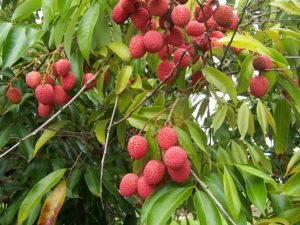The lychee (Litchi chinensis; Chinese: 荔枝; pinyin: lìzhī) is the sole member of the genus Litchi in the soapberry family, Sapindaceae.
Contents
Uses
- Traditionally, lychee has been used in many cultures for the treatment of health conditions ranging from obesity and diabetes to cough, flatulence, hernia and neuralgic pain.
According to folk remedy, the fruit possesses a number of functional properties, including anti-cancer, anti-viral, pain-relieving, diuretic and more. A study published in the Journal of Ethnopharmacology recently set out to determine whether these medicinal uses are justified.
Benefits
- Disease-Fighting Flavonoids
- Antioxidant Protection
- Heart Health
- Blood Regulation
- Rutin
- Anti-Inflammatory Benefits
- Vitamin C
- Mitochondrial Health
- Anti-Viral Activity
- More Antioxidant Power Than Vitamin C
Cautions
- There are some cautions associated with Lychee’s consumption, which may not affect negatively all the time but it is always good to be aware and safe.
Since Lychee are immune system booster so this may increase the symptoms of auto-immune diseases. It is best to use Lychee more carefully if someone has an auto-immune condition.
Lychee may cause allergies to some people who are allergic to latex, sun flower seeds and birch.
Over consumption of Lychee may cause hypoglycemia leading to fever, seizure etc. It is also recommended not to give this fruit to children on empty stomach as they are at a higher risk of being affected by hypoglycemia.
Diabetics should also hold themselves in consuming it in a excessive quantity.
Interactions
- n/a
Other names
Litchi chinensis; Chinese: 荔枝; pinyin: lìzhī
References
Source: Wikipedia, https://en.wikipedia.org/wiki/Lychee#Cultivation_and_uses
Mercola, http://articles.mercola.com/sites/articles/archive/2016/01/18/lychee-health-benefits.aspx
The hd Life, http://the-hdlife.com/lychee-health-benefits-cautions/
Image source: By B.navez – Self-photographed, CC BY-SA 3.0, https://commons.wikimedia.org/w/index.php?curid=1463941

